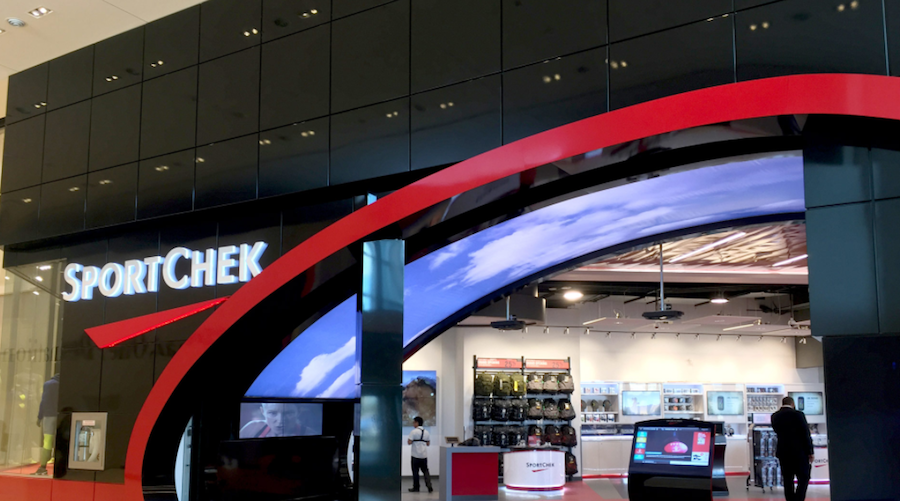Sport Chek, Canada’s largest sporting goods chain owned by Canadian Tire Inc., will be undergoing a repositioning to increase the company’s appeal to a broader range of consumers beyond millennials and “achievers,” Canadian Tire officials said on the company’s second-quarter conference call.
On a conference call with analysts, Stephen Wetmore, Canadian Tire’s president and CEO, described the goal as “realizing the full potential of the FGL business.” Canadian Tire acquired FGL (Forzani Group Ltd), which included Sport Chek and several other sports-related banners, in 2011.
“I’m very bullish about its future,” Wetmore said of Sport Chek. “I’m pleased with the leadership team Allan MacDonald (EVP, Retail) and TJ Flood (president, FGL) have in place to take this business to the next level. While Sport Chek will continue to be our digital marketing leader and destination for millenials and ‘achievers,’ we are looking to reposition the brand, creating a solutions-oriented customer experience and appealing to a broader range of customers.”
Achievers, or enthusiasts embracing the active outdoor lifestyle, have long been Sport Chek’s target customer.
Elaborating on the repositioning, MacDonald it’s still “early days” as far as what changes will be put into place. He added, however, “What I will tell you is Sport Chek’s traditional positioning around what we call ‘achievers’ has gone incredibly well,” and the chain has “good resonance” with the “very active” younger demographic. He added, “We think there’ s an opportunity to expand that. Not to exclude that category of consumers at all, but rather to make Sport Chek’s positioning in the market a little broader.”
He said the changes may result in “amping up” some categories, noting that the banner has already expanded kids assortments. Some changes may be made at the store level and online.
In marketing, he suggested Sport Chek could be doing a better job positioning the company as the place to go for people’s sports-related needs.
“The brand above the door has to speak volumes,” said MacDonald. ”It has to mean more to customers than the label on the product, and we’re going to accomplish this by creating a world-class experience for our customers. Whether they shop in store or online, we’ll be known as the destination for sports, fitness and wellness. We’ll inspire our customer with world-class stores, unique assortments, helpful and attentive staffs, engaging digital experiences and access to products in their sizes real time, however they chose to buy.”
Reworked marketing would have a goal of “positioning the brand in a way that has broader appeal, but doing it really carefully because we don’t want to alienate that core consumer that we’ve built up over time.”
Indeed, he said the changes will likely be “subtle” over the next few quarters with the investments involved typical of those in the “normal course” of business rather than a major hit at once. Learnings may be applied to other FGL banners. Besides Sport Chek, FGL includes Sports Experts, Atmosphere, PHL, National Sports and Hockey Experts in Canada.
In answer to a Q&A question, MacDonald said the repositioning isn’t in response to the slow down in same-store sales in recent quarters.
He said, “You’re always looking for opportunity within these businesses, and when you look at the appeal of Sport Chek and the asset base we have and the categories where that brand can travel, we see a lot of potential. And it has much more to do with trying to be innovative and looking at the opportunity that exists within an asset rather than reacting to any particular performance challenges it might have in the short term. We’ll always address those in a methodical and thoughtful way as we always have in the past. But, like any of our businesses, we just see a ton of potential at Sport Chek, and we want to capitalize on it. And it’s a journey. This is going to take quarters and quarters, but it’s a lot of fun.”
Still, MacDonald admitted that Sport Chek is going through some growing pains that may be part of the chain’s recent top-line growth challenges. He said, “Their growth in recent years has created a much larger and much more complex business, and like any company that goes through a period of rapid growth, operational capabilities have to catch up to sustain this level of performance and to propel to its next stage of expansion.”
Sport Chek had been delivering gangbuster growth for a few years following the 2011 acquisition. Same-store sales at FGL Sports grew 6 percent in 2016, 4.4 percent in 2015, 6.9 percent in 2014, 7.7 in 2013 and 4.9 in 2012.
But last August, Canadian Tire said FGL Sports would miss the company’s ambitious growth goals for 2017 of high-single-digit growth due to weak sales trends. FGL Sports comps wound up climbing 2.0 percent in in 2017.
Same-store sales at FGL Sports decreased 0.3 percent in the second quarter after being up 3.9 percent in the first quarter, although the dip in the latest quarter was blamed solely on the weather.
All three segments for the company–Canadian Tire, Mark’s and FGL Sports–saw double-digit comp declines in April due to wintry weather that caused the company to miss overall sales plan for the quarter. All three showed some recovery in May and June with Canadian Tire winding up 2.0 percent for the full quarter and Mark’s ahead 1.3 percent.
MacDonald said the company expected Sport Chek to be more challenge, recovering with April’s mix at the chain focused on the end of outerwear and spring rainwear season while the flagship banner, Canadian Tire, is focused on “outdoor fun.”
At the flagship Canadian Tire banner, non-weather dependent items, which have been a focus, “performed exceptionally well” in the quarter. While many seasonal categories bounced back in May and June, “the selling season for produce like cycling, spring outerwear and camping was obviously cut short,” said MacDonald.
Consolidated comparable sales were up 1.6 percent in the second quarter. Retail sales, which includes sales through distributors, grew 3.6 percent to CDA$4.25 billion. Net revenues gained 3.2 percent to CDA$3.48 billion.
Normalized net income declined 19.6 percent to CDA$174.4 from CDA$217.0 million. The latest period included a charge of CDA$10.7 million for the roll-out of the Triangle Rewards program and associated credit cards, as well as CDA$3.9 million connected to the acquisition of Helly Hansen.
Gross margins eroded 138 basis points to 31.6 percent, driven by the Financial Services segment and due to an accounting change. Retail margin rate excluding Petroleum was flat with a decrease of 30 basis points.
Wetmore also briefly talked about the acquisition of Helly Hansen, which closed on July 3. The purchase price of the acquisition was CDA$985.0 million, inclusive of the repayment of loans and other related items to the previous owners.
Wetmore said the “execution of our integration plans is well underway” and Helly Hansen will be incorporated into Canadian Tire’s results beginning in the third quarter. He said the acquisition “will be a significant growth engine for us, powered by three key focus areas.”
The first is expanding the breadth and depth of Helly’s product inside Canadian Tire’s many banners in Canada. Second is executing on Helly’s existing growth plans focused on the U.S. and core European markets, which he described as the “top priority” for Paul Stoneham, Helly Hansen’s CEO, and his team.
Third will be utilizing Helly’s’ established international network as a platform to distribute Canadian Tire-owned brands to new markets. Said Wetmore, “While the third leg is still a few years away, we are very encouraged with the runway the first two opportunities represent.”
Photo courtesy Sport Chek
















